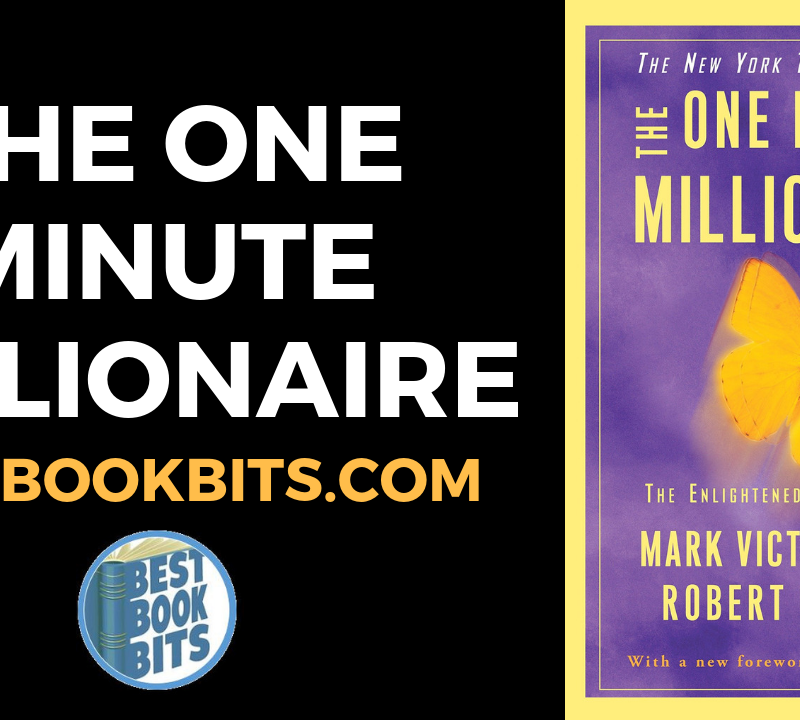★DOWNLOAD THIS FREE PDF SUMMARY HERE
? MY FREE BOOK TO LIVING YOUR DREAM LIFE”
? SPONSOR BESTBOOKBITS BY USING PATREON
? SUPPORT BESTBOOKBITS BY CLICKING THE LINKS BELOW
- 150 PDF Summaries
- Coaching Program
- Subscribe to My Channel
- Website
- Spotify
- Book Club
- Mailing List
The Book in Three Sentences
- “If you are not fully, totally, and truly committed to creating wealth, chances are you won’t”.
- “If your goal is to be comfortable, chances are you’ll never get rich. But if your goal is to be rich, chances are you’ll end up mighty comfortable”.
- “The Law of Income: You will be paid in direct proportion to the value you deliver according to the marketplace”.
The Five Big Ideas
- “If you want to move to a higher level of life, you have to be willing to let go of some of your old ways of thinking and being and adopt new ones”.
- “Having top-of-the-line tools is imperative, but being the top-notch carpenter who masterfully uses those tools is even more critical”.
- “A lack of money is never, ever, ever a problem. A lack of money is merely a symptom of what is going on underneath”.
- “All the statements you heard about money when you were young remain in your subconscious mind as part of the blueprint that is running your financial life”.
- “Money can’t make you something you already are”.
Secrets of the Millionaire Mind Summary
“Don’t just read this book. Study it as if your life depended on it”.
“I had ‘Loch Ness monster disease’: I had heard of this thing called profit, I just never saw any of it”.
“If you’re not doing as well as you’d like, all that means is there’s something you don’t know”. · “It’s not what we don’t know that prevents us from succeeding; it’s what we know that just ain’t so that is our greatest obstacle”.
“If you want to move to a higher level of life, you have to be willing to let go of some of your old ways of thinking and being and adopt new ones”.
“I have a saying: “It’s not enough to be in the right place at the right time. You have to be the right person in the right place at the right time”.
“The key to success is to raise your own energy; when you do, people will naturally be attracted to you. And when they show up, bill ’em!”
“The vast majority of people simply do not have the internal capacity to create and hold on to large amounts of money and the increased challenges that go with more money and success. That, my friends, is the primary reason they don’t have much money”.
“These four quadrants are the physical world, the mental world, the emotional world, and the spiritual world”.
“A lack of money is never, ever, ever a problem. A lack of money is merely a symptom of what is going on underneath”.
“What you hear, you forget; what you see, you remember; what you do, you understand”.
“Your financial blueprint consists primarily of the information or ‘programming’ you received in the past, and especially as a young child”.
“Your programming leads to your thoughts; your thoughts lead to your feelings; your feelings lead to your actions; your actions lead to your results”.
“All the statements you heard about money when you were young remain in your subconscious mind as part of the blueprint that is running your financial life”.
“There are three key elements of change, each of which is essential in reprogramming your financial blueprint. They are simple but profoundly powerful”.
“The first element of change is awareness. You can’t change something unless you know it exists”.
“The second element of change is understanding. By understanding where your ‘way of thinking’ originates, you can recognize that it has to come from outside you”.
“The third element of change is disassociation. Once you realize this way of thinking isn’t you, you can separate yourself from it and choose in the present whether to keep it or let it go— based on who you are today, and where you want to be tomorrow. You can observe this way of thinking and see it for what it is, a ‘file’ of information that was stored in your mind a long, long time ago and may not hold any truth or value for you anymore”.
“If you are saving your money for a rainy day, what are you going to get? Rainy days! Stop doing that. Instead of saving for a rainy day, focus on saving for a joyous day or for the day you win your financial freedom”.
“If your motivation for acquiring money or success comes from a nonsupportive root such as fear, anger, or the need to ‘prove’ yourself, your money will never bring you happiness”.
“Money can’t make you something you already are”.
“No thought lives in your head rent-free”.
“Each thought you have will either be an investment or a cost. It will either move you toward happiness and success or away from it. It will either empower you or disempower you. That’s why it is imperative you choose your thoughts and beliefs wisely”.
“Realize that your thoughts and beliefs aren’t who you are, and they are not necessarily attached to you. As precious as you believe them to be, they have no more importance and meaning than you give them. Nothing has meaning except for the meaning you give it”.
“Everything you are not doing right now, you are in the habit of not doing”.
“You have to believe that you are the one who creates your success, that you are the one who creates your mediocrity, and that you are the one creating your struggle around money and success”.
“Let me put it bluntly: anyone who says money isn’t important doesn’t have any!”
“Listen up, my friends: Money is extremely important in the areas in which it works, and extremely unimportant in the areas in which it doesn’t”.
“When your intention is to have enough to pay the bills, that’s exactly how much you’ll get— just enough to pay the bills and not a dime more”.
“The purpose of our lives is to add value to the people of this generation and those that follow”.
“Do you know the definition of an entrepreneur? The definition we use in our programs is ‘a person who solves problems for people at a profit’. That’s right, an entrepreneur is nothing more than a ‘problem solver’”.
“Another key principle, pertinent here, is that rich people focus on what they want, while poor people focus on what they don’t want”.
“Your field of focus determines what you find in life”.
“If you want to get rich, focus on making, keeping, and investing your money. If you want to be poor, focus on spending your money”.
“Again, energy is contagious: either you affect people or infect people”.
“Resenting promotion is one of the greatest obstacles to success”.
“The size of the problem is never the issue—what matters is the size of you!”
“Universe, if anyone has something great coming to them and they’re not willing to take it, send it to me! I am open and willing to receive all of your blessings. Thank you!”
“Living based in security is living based in fear”.
“The vast majority of millionaires became rich by being in their own business”.
“I believe a good coach will always ask more of you than you will ask of yourself”
Working income is important, but it is only one of the four factors that determine your net worth. The four net worth factors are:
- Income
- Savings
- Investments
- Simplification
“The single biggest difference between financial success and financial failure is how well you manage your money”. WP: Either you control your money, or it will control you.
Money Management – the JAR SYSTEM: divide each net income that you have into 5 ‘jars’ whether it be physical jars or bank accounts… best is both! The jars at home to deposit money in EVERY day, loose change, even a penny. This will put your attention on your financial freedom, and where attention goes, money flows!
Whatever money you have, begin managing it now. Do not wait another day. This action alone will send a message to the universe that you are ready for more money.
> Financial Freedom Account (FFA – 10%): This is your golden goose. This jar is your ticket to financial freedom. The money that you put into this jar is used for investments and building your passive income streams. You never spend this money. The only time you would spend this money is once you become financially free. Even then you would only spend the returns on your investment. Never spend the principal or else you’ll go broke!
> Necessity Account (NEC – 55%): This account is for managing your everyday expenses and bills. This would include things like your rent, mortgage, utilities, bills, taxes, food, clothes, etc. Basically it includes anything that you need to live, the necessities.
> Education Account (EDU – 10%): Money in this jar is meant to further your education and personal growth. An investment in yourself is a great way to use your money. You are your most valuable asset. Never forget this. Use the education money to purchase books, CD’s, courses or anything else that has educational value.
> Long Term Saving for Spending Account (LTSS – 10%): The money in this jar is for the bigger purchases. Examples: a holiday home, a big family vacation, a wedding anniversary…
> Play Account (PLAY – 10%): PLAY money is spent every month on purchases you wouldn’t normally make. The purpose of this jar is to nurture yourself.
> Give Account (GIVE – 5%): The money in this account is for giving away. When you give your money or time you’re sending a sign of abundance to the Universe. You’re telling the Universe that you have plenty of everything, you’re abundant. Giving signals abundance. This will magnetically attract more abundance to you.
Wealth Files & Wealth Principles
Wealth Files: 17 ways rich people think AND act differently from poor and middle-class people Wealth Principles: essential characteristics of (building) wealth
– Your income can only grow to the extent you do.
– If you want to change the fruits, you first have to change the roots. To change the visible, first you have to change the invisible.
– Money is a result, wealth is a result, health is a result, illness is a result, your weight is a result. We live in a world of cause and effect.
– Give me five minutes, and I can predict your financial future for the rest of your life.
– Thoughts lead to feelings. Feelings lead to actions. Actions lead to results.
– When the subconscious mind must choose between deeply rooted emotions and logic, emotions will always win.
– If your motivation for acquiring money or success comes from a nonsupportive root such as fear, anger, or the need to prove yourself, your money will never bring you happiness.
– The only way to permanently change the temperature in the room is to reset the thermostat.
– The only way to change your level of financial success “permanently” is to reset your financial thermostat.
– Consciousness is observing your thoughts and actions so that you can live from true choice in the present moment, rather than being run by programming from the past.
– You can choose to think in ways that will support you in your happiness and success instead of ways that don’t.
- Rich people believe “I create my life.” Poor people believe “Life happens to me.”
– Money is extremely important in the areas in which it works, and extremely unimportant in the areas in which it doesn’t.
– When you are complaining, you become a living breathing “crap magnet”.
– There is no such thing as a really rich victim.
- Rich people play the money game to win. Poor people play the money game to not lose.
– If your goal is to be comfortable, chances are you’ll never get rich. If your goal is to be rich, chances are you’ll end up comfortable.
- Rich people are committed to being rich. Poor people want to be rich.
– The number one reason most people don’t get what they want is that they don’t know what they want.
– If you are not fully totally and truly committed to creating wealth, chances are you won’t.
- Rich people think big. Poor people think small.
– The law of income: you will be paid in direct proportion to the value you deliver according to the marketplace.
- Rich people focus on opportunities. Poor people focus on obstacles.
- Rich people admire other rich and successful people. Poor people resent rich and successful people.
- Rich people associate with positive, successful people. Poor people associate with negative or unsuccessful people.
- Rich people are willing to promote themselves and their value. Poor people think negatively about selling and promotion.
– Leaders earn a heck of a lot more money than followers.
- Rich people are bigger than their problems. Poor people are smaller than their problems.
– The secret to success is not to try to avoid or get rid of or shrink from your problems; the secret is to grow yourself so that you are bigger than any problem.
– If you have a big problem in your life, you are being a small person.
- Rich people are excellent receivers. Poor people are poor receivers.
– If you say you’re worthy, you are. If you say you’re not worthy, you’re not. Either way you will live into your story.
– If a hundred-root oak tree had the mind of a human, it would only grow to be ten feet tall.
– For every giver there must be a receiver, and for every receiver there must be a giver.
– Money will only make you more of what you already are.
– How you do anything is how you do everything.
- Rich people choose to get paid based on results. Poor people choose to get paid based on time.
– There’s nothing wrong with getting a steady paycheck, unless it interferes with your ability to earn what you’re worth. There’s the rub. It usually does.
– Never have a ceiling on your income.
- Rich people think “both”. Poor people think “either/or”.
– Rich people believe you can have your cake and eat it too. Middle-class people believe cake is too rich, so they only have a little. Poor people don’t believe they deserve cake, so they order a donut, focus on the hole, and wonder why they have nothing.
- Rich people focus on their net worth. Poor people focus on their working income.
– The true measure of wealth is net worth, not working income.
– Where attention goes, energy flows, and results show.
- Rich people manage their money well. Poor people mismanage their money well.
– Until you show you can handle what you’ve got, you won’t get any more.
– The habit of managing your money is more important than the amount.
– Either you control your money, or it will control you.
- Rich people have their money work hard for them. Poor people work hard for their money.
– Rich people see every dollar as a “seed” that can be planted to earn a hundred more dollars, which can then be replanted to earn a thousand more.
- Rich people act in spite of fear. Poor people let fear stop them.
– Action is the bridge between the inner world and outer world.
– A true warrior can tame the cobra of fear.
– It is not necessary to try to get rid of fear in order to succeed.
– If you are only willing to do what’s easy, life will be hard. If you are willing to do what’s hard, life will be easy.
– The only time you are actually growing is when you’re uncomfortable.
– Training and managing your own mind is the most important skill you could ever own, in terms of both happiness and success.
- Rich people constantly learn and grow. Poor people think they already know.
– You can be right, or you can be rich, but you can’t be both.
– Every master was once a disaster.
– To get paid the best, you must be the best.
★DOWNLOAD THIS FREE PDF SUMMARY HERE
? MY FREE BOOK TO LIVING YOUR DREAM LIFE”
? SPONSOR BESTBOOKBITS BY USING PATREON
? SUPPORT BESTBOOKBITS BY CLICKING THE LINKS BELOW













